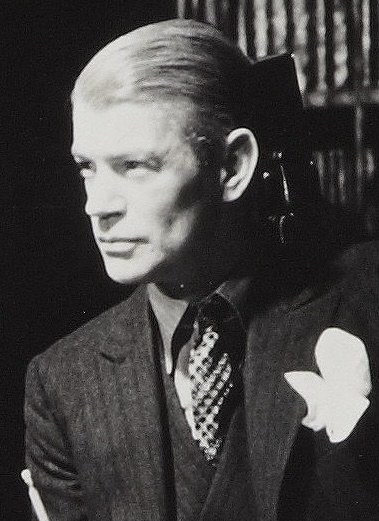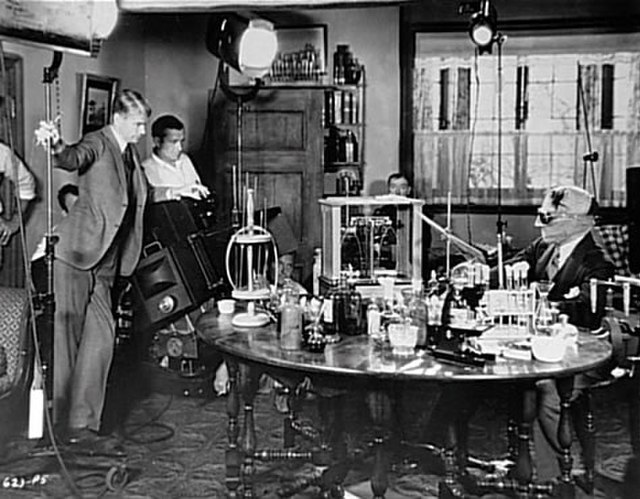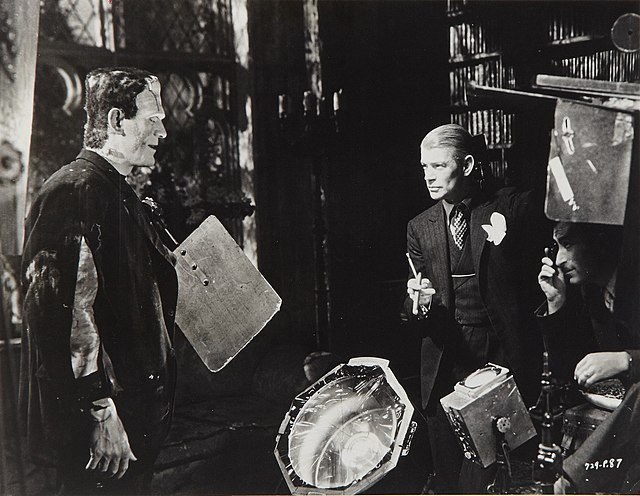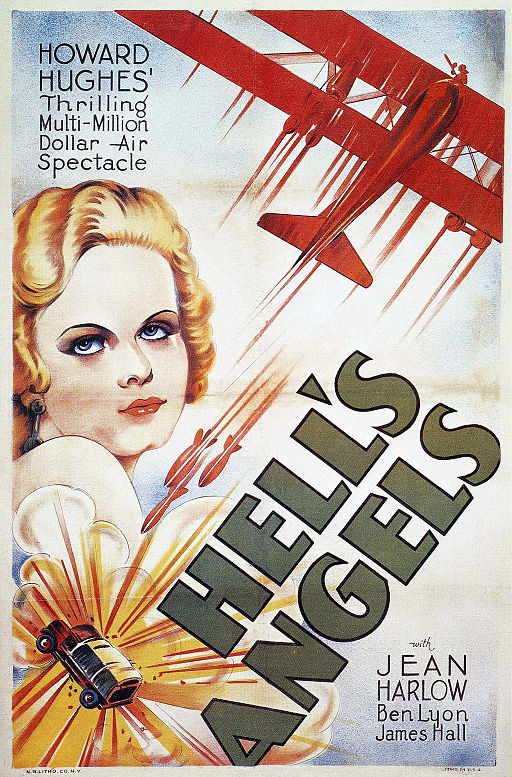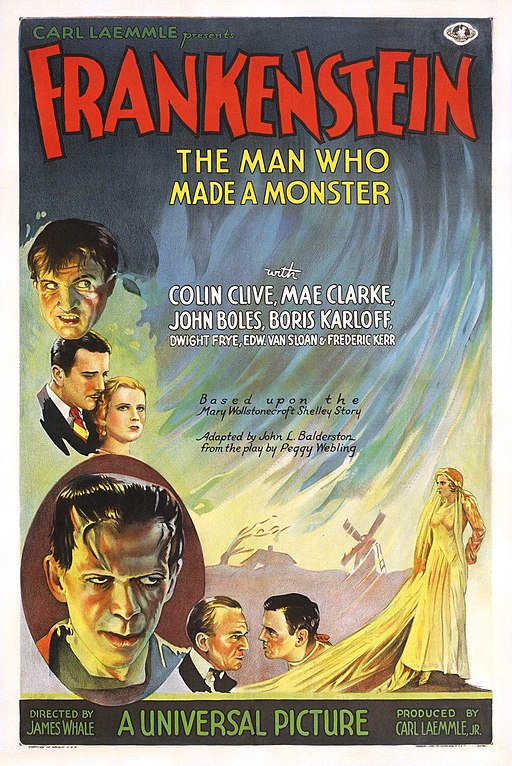James Whale
back| Full Name | James Whale |
| Born | July 22, 1889 |
| Birthplace | Dudley, Worcestershire, England |
| Died | May 29, 1957 |
| Buried | Cremated; ashes scattered at sea |
| Married to | David Lewis (long-term partner, not legally married) |
| Children | None |
| Notable films | Frankenstein (1931) - The Old Dark House (1932) - The Invisible Man (1933) - Bride of Frankenstein (1935)) |
James Whale
The Master of Gothic Horror
James Whale (1889-1957) was a pioneering film director best known for his work in the horror genre. Whale's innovative direction in "Frankenstein" (1931) and "Bride of Frankenstein" (1935) established these films as horror classics, celebrated for their atmospheric visuals and complex characters.
His films often blended dark humor with horror, showcasing his unique style. Despite a decline in his career in the late 1930s and early 1940s, Whale's influence on cinema remains significant.
Related
James Whale (1889 – 1957)
Biography, Career and Movies
James Whale was born on July 22, 1889, in Dudley, Worcestershire, England, into a working-class family. His early life was marked by financial difficulties, and he left school at an early age to help support his family. Whale discovered his passion for the arts early on and pursued various creative endeavors, including set design and acting.
World War I: During World War I, Whale served as an officer in the British Army. He was captured by the Germans and spent time as a prisoner of war. It was during his captivity that he began staging plays and discovered his talent for directing.
Theatrical Career: After the war, Whale returned to England and pursued a career in theater. He gained recognition for his work as a director on the London stage, which eventually led to opportunities in the burgeoning film industry.
Hollywood Career: James Whale moved to Hollywood in the late 1920s. His big break came with the film adaptation of the play "Journey's End" (1930), which was well-received. This success led to him being hired by Universal Pictures.
Whale is best known for his contributions to the horror genre during the early 1930s. His most iconic films include "Frankenstein" (1931), which became a defining work in horror cinema. Whale's innovative direction and ability to elicit strong performances from his actors made the film a critical and commercial success. He followed this with other notable films like "The Old Dark House" (1932) and "The Invisible Man" (1933).
His masterpiece, "Bride of Frankenstein" (1935), is often considered superior to the original. It showcased Whale's distinctive style, combining horror with dark humor and sophisticated set designs.
Later Years: Despite his success, Whale's career began to decline in the late 1930s. He directed a few more films, but none achieved the acclaim of his earlier works. Whale's open homosexuality, which was relatively accepted in Hollywood's early days, became more of an issue as the industry grew more conservative.
In the 1940s, Whale retired from filmmaking. He lived quietly with his partner, producer David Lewis, in their home in Los Angeles. Whale struggled with depression in his later years and tragically took his own life on May 29, 1957. He left a note expressing his desire to find peace from his inner turmoil.
Legacy: James Whale's films, particularly his contributions to the horror genre, have left a lasting legacy. His work has influenced countless filmmakers and continues to be celebrated for its creativity and innovation. Whale's life and career were also the subject of the 1998 film "Gods and Monsters," which explored his final days and his relationships, highlighting the complexities of his character and his impact on cinema.
The Art of the Outsider - James Whale Video:
Creative Directing Style:
James Whale's directing style is notable for its sophistication, creativity, and ability to blend various genres and tones effectively. His work, particularly in the horror genre, set new standards for the industry and left a lasting impact on filmmaking.
Visual Innovation
Expressionist Influence: Whale was heavily influenced by German Expressionism, which is evident in his use of stark lighting, dramatic shadows, and angular set designs. This style is particularly prominent in "Frankenstein" and "Bride of Frankenstein," where the visual elements create a sense of unease and otherworldliness.
Set Design and Art Direction: Whale paid meticulous attention to set design and art direction. He collaborated with talented set designers to create visually stunning and atmospheric environments that enhanced the narrative. The sets in "Frankenstein" and "The Old Dark House" are prime examples of his commitment to creating immersive worlds.
Storytelling and Pacing
Character Development: Whale focused on developing complex, multi-dimensional characters. Even in horror films, where characters can often be one-dimensional, Whale's protagonists and antagonists have depth and nuance. His portrayal of the monster in "Frankenstein" as a sympathetic figure is a testament to this approach.
Narrative Structure: Whale's films often feature tight, well-constructed narratives with a clear progression of events. He skillfully balances exposition with action, ensuring that the story unfolds at a compelling pace. This is evident in "The Invisible Man," where the plot moves briskly while maintaining suspense and intrigue.
Tone and Genre Blending
Humor and Horror: Whale had a unique ability to blend humor with horror, creating films that were both frightening and entertaining. "Bride of Frankenstein" is a notable example, as it includes moments of dark humor that provide relief from the tension while enhancing the overall experience.
Psychological Depth: Whale's films often explore psychological themes and the human condition. His characters grapple with internal conflicts and moral dilemmas, adding depth to the narrative. In "Frankenstein," for instance, Dr. Frankenstein's obsession with creation and the monster's quest for identity are central to the story's psychological complexity.
Technical Mastery
Innovative Special Effects: Whale was a pioneer in the use of special effects, particularly in "The Invisible Man," where the effects of invisibility were groundbreaking for their time. His ability to integrate these effects seamlessly into the narrative demonstrated his technical proficiency.
Camera Work and Cinematography: Whale employed dynamic camera movements and innovative cinematography to enhance the storytelling. He used close-ups, tracking shots, and creative angles to convey emotion and tension. The climactic scenes in "Frankenstein" and "The Invisible Man" showcase his skillful use of the camera to heighten drama.
Collaboration and Leadership
Work with Actors: Whale was known for his ability to elicit strong performances from his actors. He had a keen understanding of character and motivation, which he communicated effectively to his cast. This is evident in the performances of Boris Karloff in "Frankenstein" and Claude Rains in "The Invisible Man."
Team Collaboration: Whale's success was also due to his collaborative approach with his production team. He worked closely with writers, designers, and technical crew to ensure that every aspect of the film contributed to the overall vision. His partnerships with cinematographer Arthur Edeson and set designer Charles D. Hall were particularly fruitful.
Personal Quotes:
On his approach to directing:
"A director must be pretty close to omnipotent. He must know everything about the mechanics of picture making and have a memory like an almanac."
On his film "Frankenstein":
"I don't think Frankenstein is a horror picture. I think it’s a fairy tale. To me, horror is something revolting. To me, it’s a story of adventure."
On his film "Bride of Frankenstein":
“We belong dead."
On working in Hollywood:
"I have nothing in common with this place or the people here. They are so shallow."
On the creative process:
"We are all trying to get back to that perfect picture we saw when we were six years old and we sat in the one-and-nines and saw the magic shadows."
On his sexuality and its impact on his career:
"I lived my life openly and I think it made me an object of fascination and curiosity."
On his relationship with the studios:
"You can’t be a director and a nice guy. You have to be ruthless."
On his legacy:
"The only way to get rid of my ghosts is to revisit them."
Awards and Recognition:
James Whale, despite his significant contributions to the film industry, did not receive many awards or nominations during his career. His work was more widely appreciated and recognized posthumously. Here is an overview of the recognition he received during and after his career:
During His Career
Frankenstein (1931)
At the time of its release, "Frankenstein" did not receive any major awards or nominations. However, it was a commercial success and is considered a classic in the horror genre.
Bride of Frankenstein (1935)
Like "Frankenstein," "Bride of Frankenstein" was not awarded any major accolades during its time. It was well-received critically and is now regarded as one of the greatest horror films ever made.
Posthumous Recognition
Legacy Awards and Honors
Over the years, James Whale's contributions to cinema, particularly in the horror genre, have been recognized by various film institutions and retrospectives.
- National Film Registry
"Frankenstein" (1931) and "Bride of Frankenstein" (1935) have been selected for preservation in the United States National Film Registry by the Library of Congress as being "culturally, historically, or aesthetically significant."
- Cinefantastique Awards
In 1998, "Bride of Frankenstein" was honored by Cinefantastique magazine as one of the top 50 films of the genre.
- Retrospectives and Festivals
Numerous film festivals and retrospectives have celebrated Whale’s work. His films are frequently shown at horror film festivals and classic film retrospectives.
Influence and Legacy
Whale’s work has been influential in shaping the horror genre and is studied in film schools worldwide. His innovative techniques and storytelling have earned him a lasting legacy in the film industry.
Biographical Film Recognition
Gods and Monsters (1998)
The biographical film "Gods and Monsters," which explores the last days of James Whale, received critical acclaim and numerous awards:
- Academy Awards: Won Best Adapted Screenplay (Bill Condon); Nominated for Best Actor (Ian McKellen) and Best Supporting Actress (Lynn Redgrave).
- Golden Globe Awards: Nominated for Best Actor in a Motion Picture – Drama (Ian McKellen).
- Screen Actors Guild Awards: Nominated for Outstanding Performance by a Male Actor in a Leading Role (Ian McKellen).
Movies directed by James Whale:
1930
Journey's End
Synopsis: Set in the trenches of World War I, this film follows a group of British officers and their varying coping mechanisms as they await an imminent German attack. The movie focuses on the psychological impact of war and the bonds formed between soldiers.
Hell’s Angels
Synopsis: "Hell's Angels" is an epic war film directed by Howard Hughes. The story follows two brothers, Roy and Monte Rutledge, who join the Royal Flying Corps during World War I. The film showcases their experiences as fighter pilots, highlighting the dangers and sacrifices of aerial combat. It is renowned for its spectacular aerial battle sequences and groundbreaking special effects. James Whale contributed to the film as a dialogue director, working alongside Howard Hughes.
1931
Waterloo Bridge
Synopsis: During World War I, an American soldier falls in love with a British ballet dancer. The film explores their romantic relationship and the impact of war on their lives.
Frankenstein
Synopsis: Based on Mary Shelley's novel, this classic horror film tells the story of Dr. Henry Frankenstein, who creates a living being from body parts of the deceased. The creature, misunderstood and seeking acceptance, causes unintended havoc.
1932
The Impatient Maiden
Synopsis: A young nurse and an ambulance driver fall in love, but their relationship faces challenges due to their differing views on marriage and career aspirations.
The Old Dark House
Synopsis: A group of travelers seeks shelter from a storm in a creepy mansion inhabited by an eccentric family. The night turns terrifying as they uncover the household's dark secrets.
1933
The Kiss Before the Mirror
Synopsis: A lawyer defends his friend accused of murdering his unfaithful wife, leading him to question his own marriage's fidelity.
The Invisible Man
Synopsis: A scientist discovers a way to become invisible but is driven mad by his newfound power, leading him on a path of crime and terror.
By Candlelight
Synopsis: A charming butler falls in love with a beautiful woman, pretending to be his wealthy employer to win her affection. The ruse leads to comedic situations and misunderstandings.
1934
One More River
Synopsis: Based on John Galsworthy's novel, this courtroom drama follows a woman who leaves her abusive husband and becomes entangled in a scandalous trial.
1935
Bride of Frankenstein
Synopsis: A sequel to "Frankenstein," this film continues the story of Dr. Frankenstein and his monster. Pressured by his mentor, Dr. Pretorius, Frankenstein attempts to create a mate for the creature, leading to tragic consequences.
Remember Last Night?
Synopsis: After a wild party, a group of friends wakes up to find one of them dead. As they try to piece together the events of the night, they uncover surprising truths.
1936
The Road Back
Synopsis: A sequel to "All Quiet on the Western Front," this film follows German soldiers returning home after World War I, struggling to reintegrate into civilian life amidst the societal and political upheaval.
Show Boat
Synopsis: Based on the musical by Jerome Kern and Oscar Hammerstein II, the film explores the lives of performers on a Mississippi River showboat, dealing with themes of love, racial prejudice, and enduring friendship.
1937
The Great Garrick
Synopsis: A comedic tale of actor David Garrick, who is invited to perform in Paris but mistakenly believes it to be a prank by the French actors. The resulting mix-ups lead to humorous and romantic entanglements.
1938
Sinners in Paradise
Synopsis: A group of disparate individuals crash-land on a deserted island, where they must confront their past sins and learn to cooperate for survival.
Wives Under Suspicion
Synopsis: A district attorney, known for his harsh stance on crime, begins to suspect his wife of infidelity. His growing paranoia mirrors the cases he prosecutes, leading to dramatic tension.
1939
The Man in the Iron Mask
Synopsis: An adaptation of Alexandre Dumas' novel, this historical adventure follows the tale of the imprisoned twin brother of the French king and the plot to replace the tyrant with the rightful heir.
When Love is Young
Synopsis: A light-hearted musical comedy about a talented young woman striving to succeed in the competitive world of show business.
1940
Green Hell
Synopsis: In the Amazon jungle, an expedition in search of a lost treasure faces numerous perils, including rival treasure hunters and the unforgiving environment.
They Dare Not Love
Synopsis: Set during World War II, this romantic drama centers on an Austrian prince who flees the Nazis, finding refuge and love in a foreign land while planning to fight back against the oppression.

